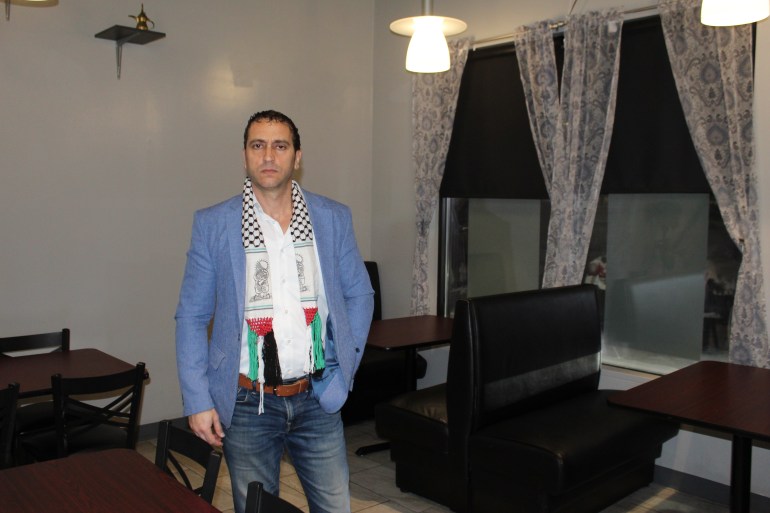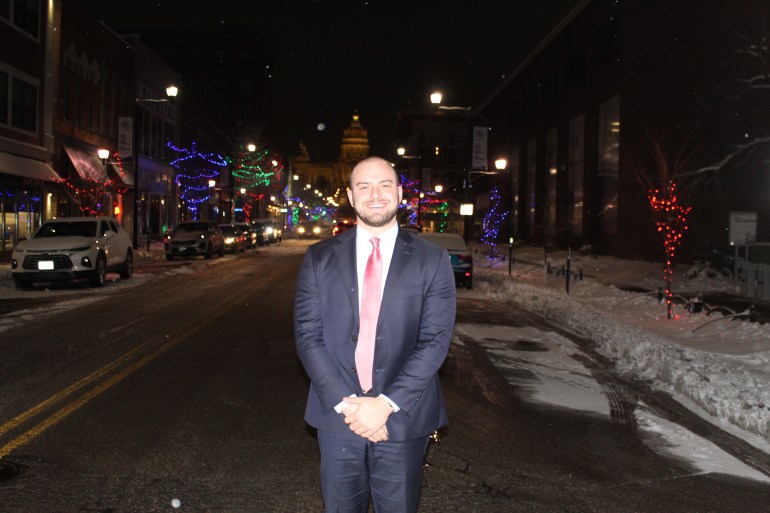ARTICLE AD
Des Moines, Iowa – National media, political pundits and United States presidential hopefuls all converged on the state capital of Des Moines this week, as it played host to the final Republican debate before the Iowa caucuses.
But just miles down the road from where Nikki Haley and Ron DeSantis traded barbs on Wednesday night, local businessman Mohamed Ali was unfazed.
“Honestly, we don’t care about them,” Ali told Al Jazeera, blowing smoke from his hookah pipe in a packed cafe outside Des Moines. “With all the debates, they all fight and compete over who supports Israel more.”
While indifferent towards the race for the Republican nomination, the 46-year-old Palestinian American father of three said one thing was certain: He would not back Democratic President Joe Biden for a second term in November.
Israel’s war in Gaza had been a turning point for Ali, who previously supported Biden in 2020.
Dressed in a white button-up shirt with a light blue blazer over it, he alternated between anger and stoicism — voicing rage over Biden’s support of Israel and apathy towards the 2024 elections.
“The Arab and the Muslim community, they are not voting for Biden. I did not talk to a single person who said he’s going to vote for Biden,” Ali told Al Jazeera, as Arabic pop music blared in the background of the cafe.
He added that even the prospect of Donald Trump’s return to the White House was not enough to spur Arab Americans to vote Democrat in the presidential race.
 Des Moines-area businessman Mohamed Ali says it is too late for President Joe Biden to win the votes of Arab Americans in Iowa [Ali Harb/Al Jazeera]
Des Moines-area businessman Mohamed Ali says it is too late for President Joe Biden to win the votes of Arab Americans in Iowa [Ali Harb/Al Jazeera]
Ali was born in Lebanon to Palestinian refugee parents. He studied in Tunisia before moving to New York and ending up in Iowa — the rural, sparsely populated state where the first Republican primary contest will take place on Monday.
But Ali, like many Arab and Muslim Americans, has found himself disillusioned with mainstream US politics as the war in Gaza unfolds. Biden has articulated “unwavering” support for Israel, and his rivals in the Republican field have all tried to outdo each other with their advocacy for the US ally.
All the while, international outcry has mounted over the rising death toll in Gaza, where an Israeli military campaign has killed over 23,700 Palestinians. Israel itself faced genocide accusations this week before the International Court of Justice.
So in Iowa, as the election approaches, many Arab Americans feel stuck between Biden and a hard place.
For now, many are spending their energy on local activism for Gaza. Ali himself has organised several Palestine solidarity protests, drawing hundreds of people in Des Moines.
‘Litmus test’
Although overwhelmingly white, Iowa is home to sizable Arab and Muslim communities: One grassroots project estimated Iowa’s Arab American population to include upwards of 17,700 people, in a state of 3.2 million.
One of the nation’s oldest mosques is in the eastern Iowa city of Cedar Rapids, an area that elected its first Arab American state legislator in 2022.
South of Cedar Rapids, in the college town of Iowa City, there is also a growing Sudanese American community. In Des Moines, meanwhile, there are clusters of Arab and Muslim Americans from the Middle East, South Asia and Bosnia.
While US Arabs and Muslims are no monolith, more than a dozen activists interviewed by Al Jazeera echoed the same sentiment: They feel alienated by Republicans, but they will not vote for Biden.
Ending the war in Gaza is now the central issue for many of Iowa’s politically active Arab Americans. They have organised protests, met with representatives and pushed ceasefire resolutions at the local level to make their voices heard.
“I find it very difficult to stomach anybody who can’t call for a ceasefire at this point, no matter what party they’re in,” said Maria Reveiz, a Lebanese American yoga instructor who owns a jazz club in Des Moines.
“I’ve left the Democratic Party. I have no affiliation. Palestine from here on out is my litmus test for anybody to get my support ever again.”
That sense of disenfranchisement among Arab and Muslim Americans in Iowa has been amplified by a lack of outreach from campaigns during this year’s presidential race.
While Democrats made headlines in 2020 for organising caucuses in Iowa mosques, Republican candidates have not reached out specifically to Arab and Muslim Americans, adding to those communities’ lack of concern with Monday’s race.
Reveiz, a curly-haired mother of three, campaigned for Bernie Sanders during the 2020 Democratic caucuses, but she has since covered a sticker of a mittened Sanders on her laptop with a Palestinian flag.
Sanders has not called for a permanent ceasefire in Gaza.
When she spoke to Al Jazeera, Reveiz’s house looked like a shrine for Palestine: a keffiyeh above the fireplace, a painting by a Palestinian artist on the wall, a scarf with the colours of the Palestinian flag on a shelf. Reveiz herself wore a pendant that said “Palestine” in Arabic around her neck.
Even a Buddha statue in the corner of her living room was draped with a Palestinian flag.
Reveiz had visited Gaza several times in the past years with an aid group to lead yoga classes designed to help address trauma. Israeli shelling has since killed one of her friends in the Palestinian territory.
“Ahmad Ismail,” Reveiz said, whispering his name but stopping short of crying. “Wonderful human.”
With Israel restricting access to food, medicine and water in Gaza, Ismail had been on his roof collecting rainwater when he was hit by shelling in Deir el-Balah.
Reveiz said she has now contacted the offices of her representatives in Congress so often that staffers recognise her. She has also written to the White House demanding a ceasefire. But she has not heard any positive responses to her requests. “It’s futile,” Reveiz told Al Jazeera.
 Sami Scheetz stands outside the Iowa state capitol in Des Moines [Ali Harb/Al Jazeera]
Sami Scheetz stands outside the Iowa state capitol in Des Moines [Ali Harb/Al Jazeera]
Iowa City resolution
About two hours east of Des Moines, ceasefire activists in Iowa City turned their attention to their city council to advance their cause.
On January 2, the Iowa City city council adopted a resolution calling for a ceasefire in a 4-3 vote. Although municipalities have little power over foreign policy, Deema Totah, a Palestinian American professor at the University of Iowa, said the measure was important.
“We need some sort of mechanism for democracy, for our voices to be heard. And in this large country, this mechanism is through local government,” Totah told Al Jazeera.
“Local government has the ability to amplify these voices, has the ability to be on the right side of history, has the ability to put on the record that there were citizens against this — that this wasn’t the view of the United States to fund the military campaign that Israel is engaging in.
“We want future history books to say that this was a unilateral decision by a government whose people did not agree with them.”
Tarweeh Osman, a Sudanese American community organiser who advocated for the resolution, said she felt recognised after the measure passed.
Still, she said, as an Arab American, she feels “unheard” and “alienated” by both Biden and the Republican presidential candidates vying for victory in Iowa.
She noted that politicians’ staunch support for Israel is translating into efforts to crack down on pro-Palestinian advocacy in the US. By way of example, she pointed to DeSantis, one of the Republican hopefuls competing in this year’s Iowa caucuses: As governor of Florida, he ordered a ban on a Palestinian rights student group at state universities.
“It’s terrifying that we’re seeing legitimate political dissent that’s protected by the First Amendment being systematically delegitimised by our political representatives to appease pro-Israel interest groups,” Osman told Al Jazeera.
But she added that another four years of Biden could also prove detrimental for Palestinian rights supporters, given the president’s unconditional backing of Israel.
For her part, Totah said she feels “erased and discarded” by rhetoric that dehumanises Palestinians from both major parties.
In October, Biden questioned the war’s Palestinian death toll, dismissing the killing of civilians as the “price of waging a war”.
“I have voted Democrat in the past. But this year, I cannot vote for Biden. And I’m looking at third-party candidates right now,” Totah told Al Jazeera.
Ceasefire calls
Sami Scheetz, a Democrat who represents neighbouring Cedar Rapids in the Iowa State Legislature, spoke in favour of the Iowa City ceasefire resolution when it was being debated earlier this month.
Scheetz said his election as the state House’s first Arab American member in 2022 reflects the “strength and diversity” of the community.
While he has not faced direct discrimination, Scheetz added that advocating for the rights of Arabs and Palestinians “during the war in Gaza has come at a political cost”.
Across the country, politicians critical of Israeli policies have faced pushback by pro-Israel groups. For example, the pro-Israel lobby group AIPAC is preparing to spend more than $100m in the next election to defeat progressives calling for a ceasefire in Congress, according to several US media reports.
But Scheetz said his advocacy was fuelled by the “alarming reality” on the ground in Gaza.
“It’s essential to stand against injustice and prioritise human rights, even when faced with these consequences,” Scheetz told Al Jazeera.
“This catastrophic devastation unequivocally demands an immediate reassessment of the current strategy, as the relentless military campaign is not only devoid of justice but also stands as a formidable obstacle to any prospect of lasting peace in the region.”
Scheetz’s Republican colleagues in the Iowa State House are preparing a resolution that fails to mention Palestinians and instead backs Israel’s “right to act decisively and unilaterally in self-defense” through its military actions in Gaza.
But the state’s Democratic Party has also strained relations with Palestinian rights advocates.
Last year, Iowa Democratic Party Chair Rita Hart condemned a Democratic student group for issuing a statement that read in part, “May every Palestinian live long and free, from the river to the sea“.
Newman Abuissa, the Arab American Caucus chair for the Iowa Democratic Party, has pushed back against Hart and called on her to apologise.
Abuissa told Al Jazeera that Arab Americans are trying to make themselves heard within the party, stressing that there is a gap between the Democratic leadership and the majority of voters who back a ceasefire in Gaza.
Asked about Arab Americans’ interest in the Republican caucuses, he said, “We have been busy working on the Israeli-Palestinian conflict for the last three months.”
 The Mother Mosque of America is one of the oldest standing mosques in the US [Ali Harb/Al Jazeera]
The Mother Mosque of America is one of the oldest standing mosques in the US [Ali Harb/Al Jazeera]
A landmark mosque
North of Iowa City, Cedar Rapids has a site steeped in symbolism for Muslim Americans: one of the country’s oldest mosques.
The Mother Mosque of America was built in 1934 by Lebanese and Syrian immigrants. Situated in a residential neighbourhood, its white building would blend with the snow-blanketed lawns that surround it, if not for its bright green dome and awning.
When Al Jazeera visited the mosque this week, Ahmed Abdoney — a US Air Force veteran — was there looking at photos of his family attending early congregations.
One photo features Abdoney when he was about 10 years old. He said his maternal grandfather was one of the founders of the mosque.
His father, meanwhile, arrived at New York’s Ellis Island in the 1930s and moved westward, working as a travelling merchant until he settled in Ohio, then moved to Iowa.
Abdoney said the Arab community in Cedar Rapids grew over the years, but people there are private, not as visible as Arab communities in other parts of the country.
“They have been very successful in small businesses, having jobs,” Abdoney said. “They help each other out. They’re always there for each other.”
 Ahmed Abdoney points to a photo of himself as a child inside the Iowa Islamic Heritage Mother Mosque of America [Ali Harb/Al Jazeera]
Ahmed Abdoney points to a photo of himself as a child inside the Iowa Islamic Heritage Mother Mosque of America [Ali Harb/Al Jazeera]
Imam Taha Tawil said the mosque shows the long history of Islam in the US, adding there are plans to expand the building to include a visitors’ centre.
Tawil stressed that the mosque is an apolitical space. Still, in 2016, he made national headlines when he invited Trump to visit the mosque after the then-candidate proposed banning Muslims from entering the US.
The imam said the invitation still stands, but he does not think the former president will take him up on it, given that he did not respond to the original one eight years ago.
“The American way is to sit down and argue and try to convince me to vote for you — not attack us then ask us to vote for you,” Tawil told Al Jazeera.
Trump ignited further controversy during his term as president by moving the US embassy in Israel to Jerusalem, a move that was seen as rejecting Palestinians’ internationally recognised claims to the holy city.
But despite Arab and Muslim Americans’ tense history with Trump, some in the community are not entirely ruling out backing the former president, who appears set to win Iowa and run away with the Republican nomination.
“If, by some miracle, Trump comes up with something that really shows he changed his views on Palestine, and we think he has some positive ideas, then he could be a choice for us,” said Ali, the Palestinian American businessman.

 1 year ago
119
1 year ago
119 
